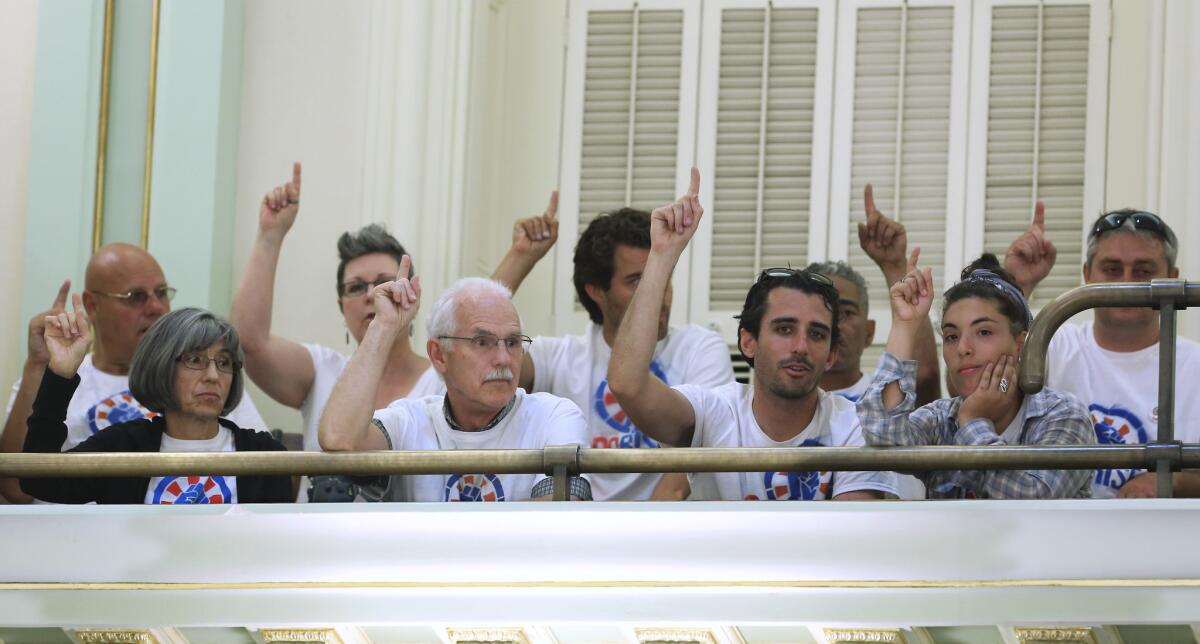Gov. Brown to decide whether California voters will sound off in November on money in politics

- Share via
Reporting From Sacramento — Lawmakers gave final approval Friday to a November ballot measure asking voters about the growing role of undisclosed donors in political campaign.
If Gov. Jerry Brown approves, the measure would ask voters on Nov. 8 whether California’s elected officials should work to overturn the controversial 2010 U.S. Supreme Court decision in the controversial Citizens United case.
“This is about trying to get the system under control,” said state Sen. Ben Allen (D-Santa Monica), the author of the legislation.
The Citizens United ruling in favor of a conservative nonprofit group opened the door to unlimited spending by corporations and unions in federal candidate campaigns.
Much of that spending is done by nonprofit organizations that, under IRS rules, do not have to disclose their donors.
The measure specifically asks California voters if state lawmakers should use “all of their constitutional authority” to overturn the Citizens United ruling. In general, that would likely mean an amendment to the U.S. Constitution proposed by Congress and ratified by the legislatures of three-fourths of the states.
That would give it long odds of having any practical meaning.
Democrats in the Legislature have been trying to get the advisory measure in front of California voters since 2014. The original attempt was challenged in court by the Howard Jarvis Taxpayers Assn. as being outside of the legislative power to place propositions on the statewide ballot. In January, the California Supreme Court ruled in favor of lawmakers but also said they would have to start from scratch with a new proposal.
Track the action in Sacramento >>
“We all know about the pernicious and pervasive role of money in politics,” Allen said during Friday’s floor debate in the Senate, “and we want to give the people in our state, the largest state in the country, the chance to weigh in on this matter.”
But Republicans took issue with what Sen. Joel Anderson (R-Alpine) described as nothing more than placing a “public opinion poll” on the ballot. And critics in 2014 accused legislative Democrats of trying to boost turnout among the party faithful.
Brown has not yet offered an opinion on the idea but nonetheless expressed concern about the 2014 version, telling lawmakers at the time they “should not make it a habit to clutter our ballots with nonbinding measures, as citizens rightfully assume that their votes are meant to have legal effect.”
The governor has 12 days to either issue a veto or allow the measure to be placed on the ballot. There it would join a plethora of other propositions in what’s shaping up to be the longest California ballot since March 2000.
Even some supporters expressed concern about how many issues voters will be asked to consider in November.
“It’s a ballot that is so long, it’s Moby Dick-like in what we’re facing,” said Sen. Bob Hertzberg (D-Van Nuys).
Follow @johnmyers on Twitter, sign up for our daily Essential Politics newsletter and listen to the weekly California Politics Podcast
ALSO
California ballot battles could hit the $500 million mark
More to Read
Get the L.A. Times Politics newsletter
Deeply reported insights into legislation, politics and policy from Sacramento, Washington and beyond. In your inbox three times per week.
You may occasionally receive promotional content from the Los Angeles Times.











